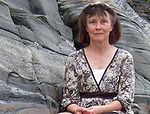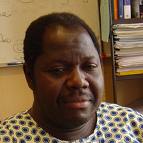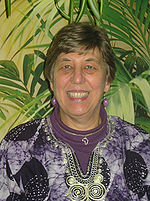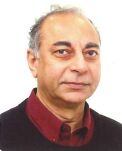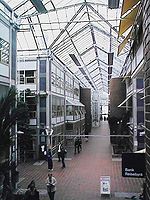Trondheim Workshop in Language Description and Documentation
September 6th - 9th 2010
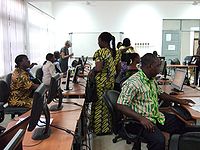
 © Jørn Adde The Trondheim Workshop in Language Description and Documentation
© Jørn Adde The Trondheim Workshop in Language Description and Documentation
© Dorothee Beermann
addresses aspects of language description and documentation.
A special focus lies on comparative Bantu studies and the description of tone.
Courses cover practical issues relating to speech and text annotation and methodological aspects of conducting semantic fieldwork, techniques for eliciting data and the interaction between methodology and theory development.
The courses are open to 20 students on the first comes first served basis.
Contents
WORKSHOP PROGRAM
The Workshop is supported by NTNU's Globalization Program
| September 6th-9th | Mondag | Dienstag | Mittwoch | Donnerstag |
| 9:30-12:00
|
11:00-11:10 Opening of the Workshop by the Dekan for the Humanities Keynote: Documentary and descriptive linguistics: interdisciplinary perspectives Felix Ameka |
Abdulaziz Lodhi room D118 |
Semantic Fieldwork
Henrik Bergquist
11:00-12:00 Tone Constance Kutsch Lojenga' room D137 |
Comparative Bantu
Absulaziz Lodhi
Text Annotation Online Dorothee Beermann room D 1111 |
| 13:15 - 15:30
|
Semantic Fieldwork
Henrik Bergquist room D 172 |
Tone
Constance Kutsch Lojenga' room D 112 |
Text Annotation Online Dorothee Beermann room D 137 |
Final Session
Digitial Resources, Lexica, Grammars - Who needs what? Discussion |
| 17:15-19:00
coffee break 18:00-18:15 |
Case Study
Community Oriented Language Documentation for the Ghana-Togo-Mountain Languages Felix Ameka |
Practical Workshop
Praat Wim van Dommelen |
Practical Workshop
Praat Wim van Dommelen |
sponsored
Workshop Dinner |
REGISTRATION
Registration time has passed. If you have question about free student places, please contact us by sending mail to the ldd.workshop.
Workshop Dinner
The workshop dinner takes place at the Trondheim Festning.
Those interested in vegetarian food please contact us.
STUDENT ACCOMMODATION
The Trondheim Youth Hostel...Reviews of the Youth Hostel
The LDD has made a group reservation at the Trondheim Youth Hostel which allows us to offer very reasonably prized single rooms for the workshop period.
For a reservation of a room at the Trondheim Youth Hostel please send a short mail to: ldd.workshop
If you prefer to book a room in one of the many hotels in Trondheim you find more information at Trondheim's Offical Website
MORE ABOUT THE LECTURES AND THE LECTURERS
Semantic Fieldwork

Semantic field work includes a number of issues that relate to methodology, data collection, and analysis.
As a separate branch of the linguistic enterprise, language documentation emphasizes the process of data collection and the annotation of data as central concerns that are treated as separate from the analytical aspect of language documentation.
There are some important implications of such a view that may benefit a wider and deeper semantic analysis of lesser described languages.
The lectures of this workshop will focus on the problem of translation in a documentation context and the role of metadata in the annotation of language materials resulting form language documentation.
Some important differences between language description and language documentation will also be discussed as a motivation for the central issues discussed in the lectures.
Text Annotation Online
Text Annotation or Interlinear Glossing (IG) is one of the most common methods used by linguists across fields.
This is not so surprising since IG results from a long tradition of aligning natural language text with one
or several lines of annotation consisting of a short-hand that indicates the text's internal grammatical structure.
IG is the main means to communicate linguistic data, making Interlinear Glosses the main currency of modern linguistics.
Yet, we as linguists do not share a common understanding concerning the function of IG neither in our daily research nor in our publications.
In this course we treat Interlinear Glosses as a language resource (unfortunately not yet a common assumption).
We discuss linguistic annotation standards, depth of annotation and data pertinence.
We will learn how to build small corpora, and how to be more conscientious about metadata.
The creation of reusable data and practices of data and knowledge sharing will be addressed.
We will make use of practical examples from different languages to show how to build pertinent and reusable linguistic resources.
The participants will be introduced to the online database TypeCraft and to methods of language documentation online.
Praat
This course will give a short introduction to the use of the programme Praat in the annotation and instrumental analysis of speech.
The first part will deal with the task of mapping linguistic units (like phrases, syllables, phonemes) onto the physical speech signal.
In order to be able to perform such a task we need to acquire some knowledge about the acoustic properties of the speech signal.
Apart from the technical aspects of speech annotation, the main challenge is the variability of the speech signal.
It will be discussed how to deal with this variability using phonemic or phonetic transcription.
The second part of this course will focus on the acoustic analysis of the speech signal. We will look into:
- vowel and consonant duration
- vowel quality
- intonation and tone
Please note that instrumental analysis is a demanding task. Therefore, it may be necessary to reduce the number of issues.
For your convenience, the second part of the programme will be flexible and may be changed on the basis of your current research interests.
Community Oriented Language Documentation for the Ghana-Togo-Mountain Groups
In this tutorial we will pay attention to the question “who is language documentation for?”, and discuss the efforts we are making in
collaboration with some Ghana-Togo-Mountain communities to generate documentation products. In the first part we will introduce the
sociolinguistic context of the GTM languages-their multilingual character and the limited domains of use of the community languages.
In the second part we discuss the challenges and unintended consequences of designing orthographies, producing literacy primers,
dictionaries and grammars. We will also consider issues of language use in education in these communities.
Tone
The introduction to this short course on Tone starts with a brief overview on Tone in the world’s languages and Tone in African languages.
The question what a tone language really is needs some discussion.
Some topics related to the difference between surface and underlying structure will be treated. Following that, elicitation, transcription, and methodology will be discussed.
Some main thoughts on typology, and, finally, the lexical and grammatical function of Tone are treated and exemplified with examples from languages from all over Africa.
Bantu
This is a short introduction to Bantu languages, with a brief history of research in Comparative Bantu. The focus is on the Standard Bantu Noun
Classification System, Verbal Extensions and Tense-Aspect Markers/TAM, with special reference to Swahili and a dozen other major Bantu languages.
During sessions 2 and 3 we shall also go through a short comparative lists of selected Proto-Bantu items and their realizations in some languages in
east, central and southern Africa.
The three one hour sessions of the course will deal with
1) Introduction to Bantu languages with a history of research
2) Noun Classification in Bantu languages
3) Verbal Extensions and Tense-Aspect Markers/TAM
Digitial Resources, Lexica, Grammars - Who needs what?
more information soon
WORKSHOP LOCATION
The LDD workshop is located at Dragvoll the campus of the Humanities (Det humanistiske fakultet (HF)) and the Faculty of Samfunnsvitenskap and Teknologiledelse (SVT) of the Norwegian University of Science and Technology in Trondheim.
At the Dragvoll campus you find next to the University library also a book store, a kiosk with a post service, a Mensa, and a coffee shop.
A map of the campus can be found HERE.
The location of the workshop on campus will be announced as soon as it becomes available.



